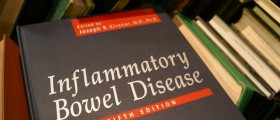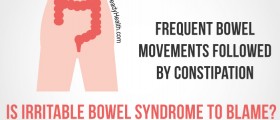Those who suffer from endometriosis may sometimes wait for a proper diagnosis because it is rather common for medical conditions related to the bowel not to be connected to endometriosis that easily. Most patients who suffer from endometriosis usually suffer at least some bowel symptoms.
Among the most common symptoms which can be associated with endometriosis are certain bowel symptoms such as rectal bleeding, rectal pain, abdominal pain, nausea, vomiting, intestinal cramping, diarrhea, constipation, alternating constipation and diarrhea, and painful bowel movements.
In some cases, a person experiences only one symptom, but there are also cases where multiple symptoms may be experienced.

What Causes Bowel Symptoms in Endo Patients?
In most cases, endometriosis does not occur in the bowel, but there are still certain rare cases in which endometriosis can be found directly in the bowel of the patient. In these cases, the patient usually suffers from a localized or superficial disease, but it gets removed by laparoscopic excision.
The outer layer of the bowel can be easily removed without damaging the muscular portion of the bowel. In some cases, certain portions of the muscular part of the bowel also need to be removed. Some cases may require even more significant surgery, such as multi-focal implants or segmental bowel resection. The cases in which endometriosis does not affect the bowel directly, it still may trigger certain symptoms which may affect the bowel.
The tissue may release certain inflammatory mediators as a simple response to an injury or inflammation. Among them, there may be included cytokines, interleukins, tumor necrosis factor, and prostaglandins. These may trigger scarring, the production of new blood vessels, and several other different complications and reactions. Prostaglandin is also known for being able to induce smooth muscle contractility and increased contractions of the bowels, which may lead to the onset of intestinal cramping and diarrhea.
- Deep endometriosis (DE) is defined as subperitoneal invasion by lesions exceeding 5 mm in depth. Disease involving the bowel can be associated with severe pain. DE can be found at multiple locations within the pelvis, but more frequently remain localized to the posterior compartment where it can involve the ureters, the torus uterinum, the uterosacral ligaments, the bowel, and the vaginal wall.
- Bowel endometriosis typically presents as a single nodule, with a diameter larger than 1 cm, commonly infiltrating the muscularis of the bowel and the surrounding structures. Bowel involvement accounts for 5% to 12% of the women presenting with the disease, with the rectum and sigmoid involved in up to 90% of all intestinal lesions.
- Symptoms of bowel endometriosis can be non-specific consisting of dysmenorrhoea and dyspareunia. More specific bowel-related symptoms such as diarrhea, constipation, dyschezia and rarely bowel obstruction depend on disease localization, size of nodule and depth of involvement of the bowel wall. However, any pelvic symptoms, specifically cyclical in nature should raise the suspicion of endometriosis. In some instances of bowel endometriosis, women remain asymptomatic, with 5% of the larger lesions remaining symptom free and in whom surgical resection is probably not indicated.
- The natural progression of endometriosis has never been well defined it is not clearly understood how endometriosis progresses. There is no clear evidence of typical small lesions evolving into cystic or deep infiltrating lesions, but logically, large nodules must have developed over time. Equally, it is not unusual to observe small lesions that regress. Clinically, intestinal deep infiltrating endometriosis does not appear to progress rapidly if surgical treatment is delayed, and regarding recurrence, it is unclear whether this constitutes disease recurrence, or in fact, represents residual lesions following incomplete resection. Typically, deep endometriosis lesions progress slowly although rapid progression can occur.
- It is important to recognise that endometriosis seems to have a negative impact not only on women’s ability to conceive but also on pregnancy outcomes. A study by Exacoustos et al, conducted on 101 women who became pregnant with a residual DIE nodule of ?2 cm following previous surgery for endometriosis showed a significantly higher risk of hypertension, placental abruption, placenta praevia, preterm birth, caesarean section, hemoperitoneum, and postpartum hysterectomy.
Other Causes of Bowel Pain
There are also certain other types of factors that may cause bowel symptoms in those who suffer from endometriosis. The most common of those include medical conditions such as ulcerative colitis, Crohn’s disease, and irritable bowel disease. Those who suffer from irritable bowel disease usually experience symptoms such as intestinal cramping, diarrhea, constipation, alternating diarrhea and constipation, and abdominal pain.
Those who suffer from Crohn’s disease commonly experience hemorrhoids, anemia, fatigue, mouth ulcers, bowel obstruction, and abscesses.
The appendix is a very important gastrointestinal organ that may also contribute to bowel symptoms in some cases, usually manifested as pelvic or abdominal pain.

















Your thoughts on this
Loading...